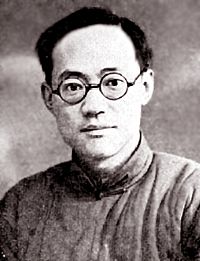Ba Jin facts for kids
Quick facts for kids
Ba Jin
|
|
|---|---|

Ba Jin in 1938
|
|
| Born | 25 November 1904 Chengdu, Sichuan, Qing dynasty, China |
| Died | 17 October 2005 (aged 100) Shanghai, People's Republic of China |
| Pen name | Ba Jin |
| Occupation | Novelist |
| Notable works | Turbulent Stream: The Family, Spring, and Autumn Love Trilogy: Fog, Rain, and Lightning |
| Notable awards | 1983: Legion of Honour 1990: Fukuoka Prize (special prize) |
| Spouse |
Xiao Shan
(m. 1927; died 1972) |
| Children | Li Xiaolin Li Xiao |
| Ba Jin | |||||||||
|---|---|---|---|---|---|---|---|---|---|
| Chinese | 巴金 | ||||||||
|
|||||||||
| Alternative Chinese name | |||||||||
| Traditional Chinese | 李堯棠 | ||||||||
| Simplified Chinese | 李尧棠 | ||||||||
|
|||||||||
Ba Jin (Chinese: 巴金; pinyin: Bā Jīn; 25 November 1904 – 17 October 2005) was a famous Chinese writer. He also wrote in Esperanto, a language created to be easy for everyone to learn. Ba Jin was also a political activist. He wrote important books like The Family in the 20th century.
Contents
What was Ba Jin's real name?
Ba Jin was born with the name Li Yaotang. He chose "Ba Jin" as his pen name, which is how most people know him. Sometimes, he was also called Li Pei Kan.
Ba Jin's Life Story
How did Ba Jin's early life influence him?
Ba Jin grew up in Chengdu, Sichuan, China, in a large family. His mother and private teachers taught him to read and write. When he was 15, he read a pamphlet by Peter Kropotkin that talked about freedom and fairness. This book greatly influenced his ideas.
He also became friends with Emma Goldman, a writer he called his "spiritual mother." They wrote letters to each other for many years.
In 1920, Ba Jin went to a foreign language school to study English. There, he helped create a literary magazine called Crescent. He also joined a group called the Equality Society. This group believed in a society with more freedom and less government control.
Later, he moved to Shanghai and then to Southeast University in Nanjing. He wanted to escape his family's old-fashioned ways. While studying, he learned Esperanto. He also joined protests for social justice and wrote about people who fought for fairness.
What did Ba Jin do in France?
In 1927, Ba Jin traveled to Paris, France, to study more. He found life there a bit boring. He often walked in the Jardin du Luxembourg and took French lessons. He was inspired by statues of famous thinkers like Jean-Jacques Rousseau.
He also loved the Seine River and the bells of Notre Dame Cathedral. Even though he was far from home, he felt lonely. He missed his family and China.
Because he was bored, Ba Jin started writing his first novel, Miewang (which means "Destruction"). He also continued his activism in France. He translated many works about freedom and fairness into Chinese. He even met famous leaders who shared his ideas.
Ba Jin was very upset when two Italian immigrants, Sacco and Vanzetti, were unfairly executed in America. He wrote a short story called The Electric Chair to protest this injustice.
What happened to Ba Jin in Shanghai and later in life?
Ba Jin returned to Shanghai in 1928. He kept writing and translating books. His first novel, Destruction, was published in a literary magazine in 1929.
Over the next 10 years, Ba Jin became an editor for several important publishers. He also wrote his most famous books. These include The Family (1931) and The Love Trilogy: Fog (1931), Rain (1933), and Lightning (1935).
During the Second Sino-Japanese War, Ba Jin worked to spread messages against the Japanese invasion. He finished his "Torrents Trilogy" with Spring (1938) and Autumn (1940). After the war, he wrote other strong novels like Cold Nights (1947). He stopped writing fiction after the People's Republic of China was formed.
During the Cultural Revolution, a difficult time in China, Ba Jin faced many challenges. He was unfairly treated. Sadly, his wife, Xiao Shan, passed away during this time because she couldn't get medical care. This deeply affected Ba Jin.
After 1977, things got better for him. He was chosen for important national writing jobs. He became the chairman of the Chinese Writers' Association in 1983. In his later years, he wrote Suixiang Lu ("Random Thoughts"). In this work, he bravely shared his thoughts about the Cultural Revolution. He even asked for a museum to be built to remember that time.
Ba Jin's writing was influenced by many foreign authors. His style was simple and easy to understand. This made him one of the most popular modern Chinese writers.
Ba Jin suffered from Parkinson's disease starting in 1983. This illness made it hard for him to speak and walk in his later years. He passed away from cancer in Shanghai in 2005, at the age of 100. His death marked the end of an important era for Chinese literature.
An Asteroid named 8315 Bajin was named in his honor.
Ba Jin's Family
Ba Jin's son, Li Xiao, is also a fiction writer.
Ba Jin's Famous Works
Ba Jin wrote many books, including novels, short stories, and non-fiction. Some of his most well-known works are:
- The Family (1933)
- The "Love" Trilogy: Fog (1931), Rain (1933), and Lightning (1935)
- The "Torrents" Trilogy: Spring (1938) and Autumn (1940)
- Cold Nights (1947)
- Random Thoughts (1978–86)
Images for kids
See also
 In Spanish: Ba Jin para niños
In Spanish: Ba Jin para niños


